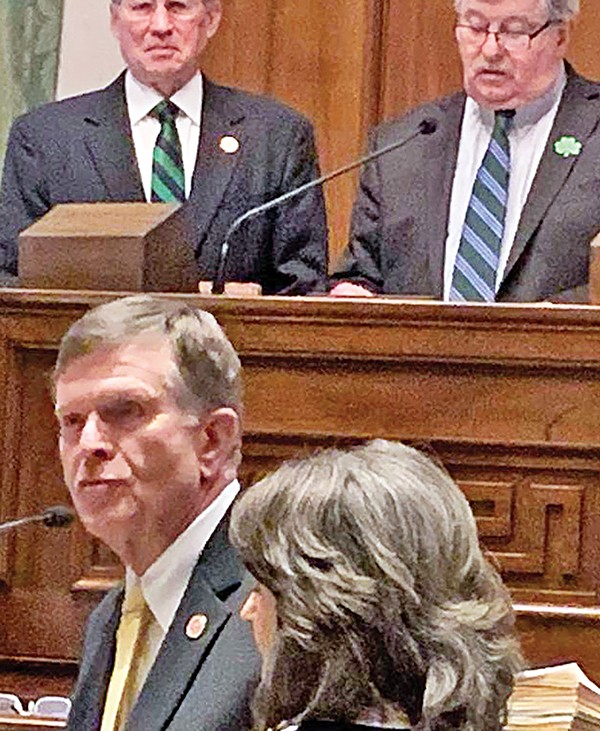NASHVILLE — That old saying about ill winds blowing somebody some good applies to the version of the community oversight bill passed on Monday night by the Tennessee Senate. In this case, it applies to supporters of the Civilian Law Enforcement Review Board (CLERB) in Memphis.
CLERB is the Bluff City’s equivalent of Nashville’s Community Oversight Board (C.O.B.), voted into being last November by voters in the state’s Capital city. It is the existence of the Nashville board and, in particular, the power of subpoena it was created with, that prompted the dominant Republican supermajority in the General Assembly to support Senate Bill 1407/House Bill 658, which would limit the powers of the C.O.B. — or of any community oversight board — to the mere advisory function toward the conduct of city law enforcement that CLERB enjoys.
In Memphis, only the Memphis City Council can employ a subpoena in relation to alleged excesses by the Memphis Police Department. CLERB can request one but cannot act on its own.
But SB 1407 contains amendments that would allow a methodology for subpoenas to be issued at the behest of a community oversight board. A Circuit Court or Chancery Court judge would have to approve the request, and it would have to be made by a chief of police, the internal affairs division of a police department, or a special investigator.
It is the provision for a special investigator that could expand the powers of CLERB. That was the conclusion reached by two Democratic Memphis state Senators — Raumesh Akbari and Katrina Robinson — in the wake of their No vote for the Senate measure, taken, as they acknowledged, out of solidarity with Nashville Democrats who resisted the measure. (The other Memphis Democrat in the Senate, Sara Kyle, also voted against the measure.)
But, as Akbari said afterward, almost in the hushed tone of someone who had found money along a walking path and realized she might have to relinquish it to a claimant at some point, “This would allow CLERB to hire a special investigator in Memphis and ask for subpoenas. That’s something they can’t do now.” Robinson concurred with that sentiment.
The “claimant” in Nashville that could nullify this apparent stroke of fortune for CLERB advocates is the other legislative chamber, where HB 658, the House version of the C.O.B. bill would make no allowance for any subpoena power for a civilian oversight board.
At some point, representatives of the two legislative chambers are likely to sit in conference to determine a final agreed-upon version of the oversight measure. Supporters of CLERB will find themselves waiting to see which way the wind blows.
• In the Tennessee General Assembly, legislation on matters of sexual orientation is often introduced in disguise or in Trojan Horse measures designed to conceal the actual purpose of a measure. Such was the case last Wednesday in the House Criminal Justice subcommittee, when HB 1151 by Representative John Ragan (R-Oak Ridge) came up for discussion.
In brief, what the bill does is designate a series of places (bathrooms, locker rooms, dressing rooms) as “public areas” where laws against indecent exposure would apply.
Candidly enough, Ragan began accounting for the bill’s purpose with a “background” explanation that it was needed to “ensure clarity” because of the Obama administration’s having intervened on behalf of transgender students using facilities other than those for “whatever they were naturally.” Ragan went on to mention rulings that “created a lot of confusion” and threatened the state with a loss of federal funding.
He was about to delve further into those circumstances when Representative Michael Curcio (R-Dickson), evidently alarmed at this fiddling with the lid of a Pandora’s box and the overt disclosure of the transgender issue, interrupted with a challenge that Ragan’s explanation had nothing to do with “the bill that was called.”
Uncomprehending that he had pulled aside what was meant to be a veil, Ragan protested that what he had said was merely the necessary background.
Curcio interrupted again: “I don’t think it is.” And he stressed that the bill merely identified the aforementioned “public places” as areas where strictures against indecent exposure would apply. “And that’s all it does.”
Unavoidably, as discussion of the bill became general, it was acknowlledged that the bill went on to describe these newly identified places as “designated for single-sex, multi-person use, if the offender is a member of the opposite sex designated for use.”
It became obvious, in short, that HB 1151 was a redux version of the infamous “bathroom bill,” scrubbed away in the previous two legislative seasons, due largely to pressure from the state’s business communities.
Alarmed at the unintended forthrightness of the developing discussion, committee chair Andrew Farmer (R-Sevierville) took up the argument for the bill from both Ragan and Curcio, explaining, in effect, that there was nothing to see here. “We’re just making it clear that those are public places.” Indecent exposure, he said, was “already a crime.”
Representative Antonio Parkinson, a Memphis Democrat and this year’s chairman of the Shelby County delegation, wondered in that case why it was necessary to spell out restrooms, locker rooms, and so forth. Farmer replied that too many laws are “vague” and that they should be “tight.”
Parkinson persisted: “If a person walks into anywhere and exposes themselves to someone, that’s criminal already, so why are we adding this to it?”
Farmer repeated: “We don’t need vague laws. We need to be specific so the public understands our intent.” Parkinson threw up his hands. “If that’s true, we don’t have enough room or space in our law library” for the places that could be listed. “We didn’t list this room, and I’m not trying to be funny.”
As for Farmer’s concern that the public understand the intent of the legislation, Representative William Lamberth (R-Portland), the House majority leader, had meanwhile spelled it out:
“Until recent years,” Lamberth said, “it was not envisioned that individuals with anatomical differences would be in the bathrooms of the opposite sex.” The bill, he said, “recognizes that in today’s world there may be individuals biologically of one sex in a bathroom that may be marked for another sex.” A bathroom, he said, was “not actually in the code as a public place, though it may be more of a public place than it once was.”
With all the blinders off and the euphemisms cast aside, the newly revived bathroom bill was passed on this week to the full Judiciary Committee, which is very likely to become a highly public place itself.
…

Paul Rose (R-Covington) was sworn in last week by Lieutenant Governor Randy McNally (top, right) as new state senator for District 32, which covers a part of Memphis.
 JB
JB 